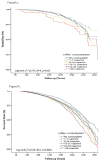Association of coffee consumption with all-cause and cardiovascular disease mortality
- PMID: 23953850
- PMCID: PMC3835155
- DOI: 10.1016/j.mayocp.2013.06.020
Association of coffee consumption with all-cause and cardiovascular disease mortality
Abstract
Objective: To evaluate the association between coffee consumption and mortality from all causes and from cardiovascular disease.
Patients and methods: Data from the Aerobics Center Longitudinal Study representing 43,727 participants with 699,632 person-years of follow-up were included. Baseline data were collected by an in-person interview on the basis of standardized questionnaires and a medical examination, including fasting blood chemistry analysis, anthropometry, blood pressure, electrocardiography, and a maximal graded exercise test, between February 3, 1971, and December 30, 2002. Cox regression analysis was used to quantify the association between coffee consumption and all-cause and cause-specific mortality.
Results: During the 17-year median follow-up, 2512 deaths occurred (804 [32%] due to cardiovascular disease). In multivariate analyses, coffee intake was positively associated with all-cause mortality in men. Men who drank more than 28 cups of coffee per week had higher all-cause mortality (hazard ratio [HR], 1.21; 95% CI, 1.04-1.40). However, after stratification based on age, younger (<55 years old) men and women showed a significant association between high coffee consumption (>28 cups per week) and all-cause mortality after adjusting for potential confounders and fitness level (HR, 1.56; 95% CI, 1.30-1.87 for men; and HR, 2.13; 95% CI, 1.26-3.59 for women).
Conclusion: In this large cohort, a positive association between coffee consumption and all-cause mortality was observed in men and in men and women younger than 55 years. On the basis of these findings, it seems appropriate to suggest that younger people avoid heavy coffee consumption (ie, averaging >4 cups per day). However, this finding should be assessed in future studies of other populations.
Keywords: ACLS; Aerobics Center Longitudinal Study; BMI; CRF; CVD; body mass index; cardiorespiratory fitness; cardiovascular disease.
Copyright © 2013 Mayo Foundation for Medical Education and Research. Published by Elsevier Inc. All rights reserved.
Figures



Comment in
-
Factors affecting the association of coffee consumption with all-cause and cardiovascular disease mortality.Mayo Clin Proc. 2013 Dec;88(12):1491-2. doi: 10.1016/j.mayocp.2013.10.010. Mayo Clin Proc. 2013. PMID: 24290124 No abstract available.
-
Coffee consumption and all-cause mortality: it may be premature to advise limiting coffee consumption in younger nonsmokers.Mayo Clin Proc. 2013 Dec;88(12):1491. doi: 10.1016/j.mayocp.2013.10.002. Mayo Clin Proc. 2013. PMID: 24290125 No abstract available.
-
Heavy coffee drinking and age-dependent all-cause mortality.Mayo Clin Proc. 2013 Dec;88(12):1492-3. doi: 10.1016/j.mayocp.2013.10.004. Mayo Clin Proc. 2013. PMID: 24290126 No abstract available.
-
Importance of sleep disorders in assessing the association between coffee consumption and all-cause mortality.Mayo Clin Proc. 2013 Dec;88(12):1492. doi: 10.1016/j.mayocp.2013.10.005. Mayo Clin Proc. 2013. PMID: 24290127 No abstract available.
-
In reply--Association of coffee consumption with all-cause and cardiovascular disease mortality.Mayo Clin Proc. 2013 Dec;88(12):1493-4. doi: 10.1016/j.mayocp.2013.10.003. Mayo Clin Proc. 2013. PMID: 24290128 No abstract available.
-
Is coffee harmful? If looking for longevity, say yes to the coffee, no to the sugar.Mayo Clin Proc. 2014 Apr;89(4):576-7. doi: 10.1016/j.mayocp.2014.01.018. Mayo Clin Proc. 2014. PMID: 24684879 No abstract available.
-
In reply--is coffee harmful? If looking for longevity, say yes to the coffee, no to the sugar.Mayo Clin Proc. 2014 Apr;89(4):577. doi: 10.1016/j.mayocp.2014.01.019. Mayo Clin Proc. 2014. PMID: 24684880 No abstract available.
References
-
- National Coffee Association. [Accessed December 26, 2012];Coffee Drinking Trends Survey. 2012 Website. www.ncausa.org/i4a/pages/index.cfm?pageid=731.
-
- van Dam RM, Hu FB. Coffee consumption and risk of type 2 diabetes: a systematic review. JAMA : the journal of the American Medical Association. 2005;294:97–104. - PubMed
-
- Tuomilehto J, Hu G, Bidel S, Lindstrom J, Jousilahti P. Coffee consumption and risk of type 2 diabetes mellitus among middle-aged Finnish men and women. JAMA : the journal of the American Medical Association. 2004;291:1213–1219. - PubMed
-
- Salazar-Martinez E, Willett WC, Ascherio A, et al. Coffee consumption and risk for type 2 diabetes mellitus. Annals of internal medicine. 2004;140:1–8. - PubMed
Publication types
MeSH terms
Substances
Grants and funding
LinkOut - more resources
Full Text Sources
Other Literature Sources

